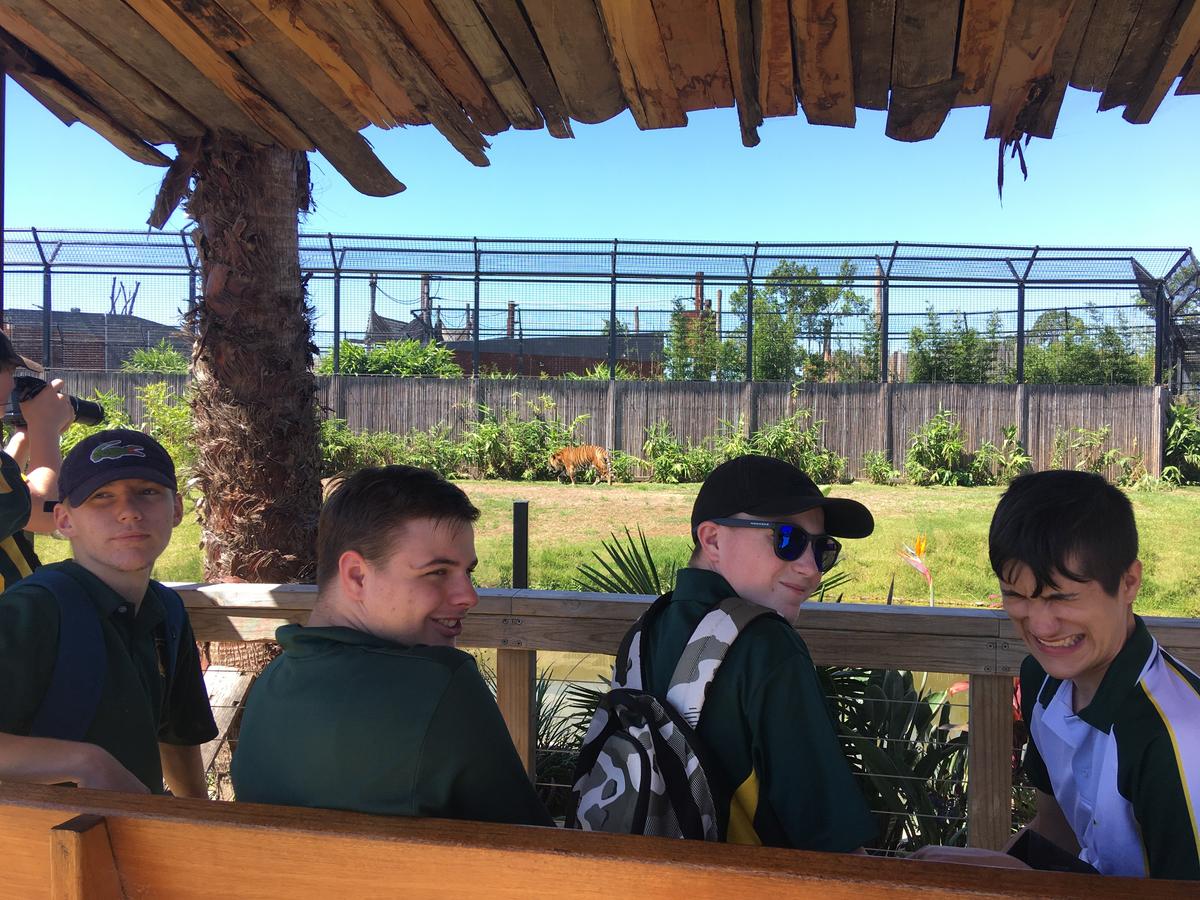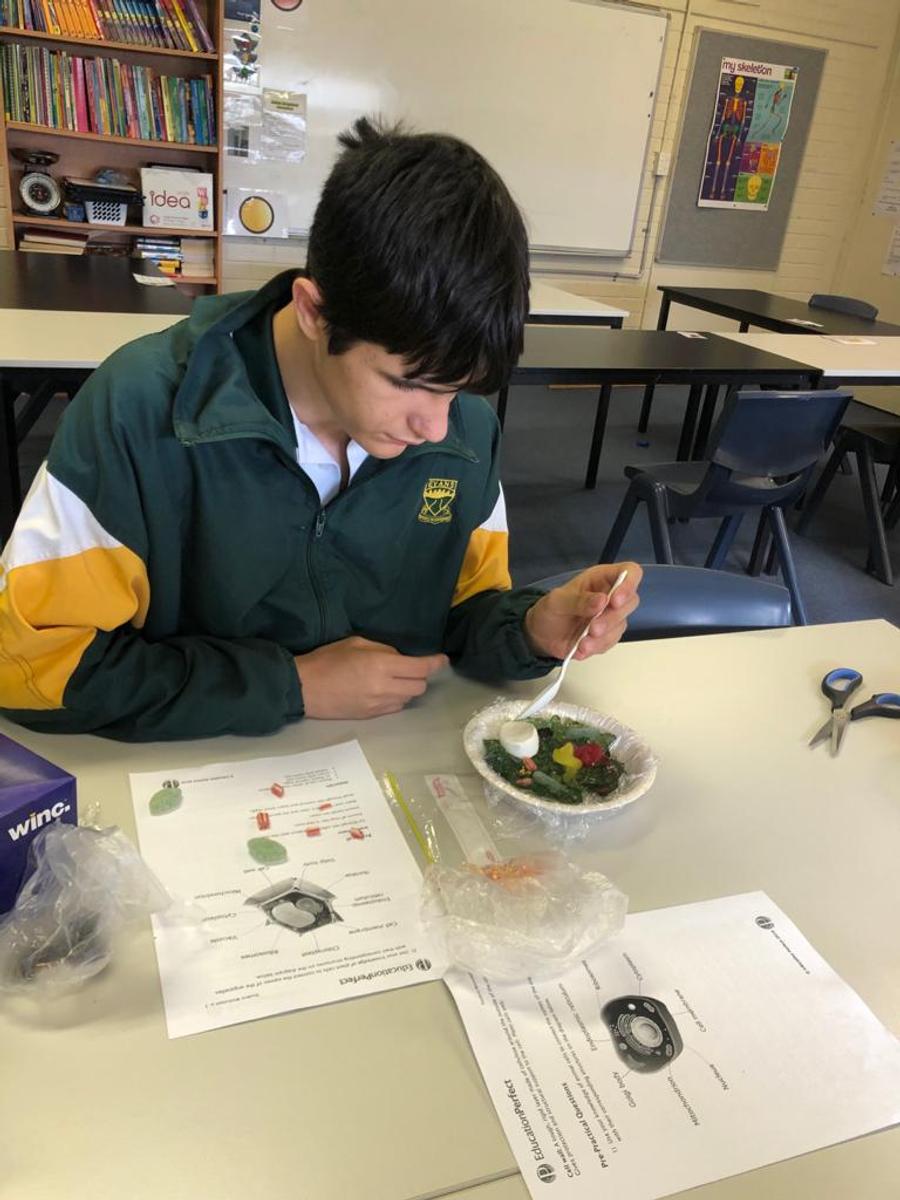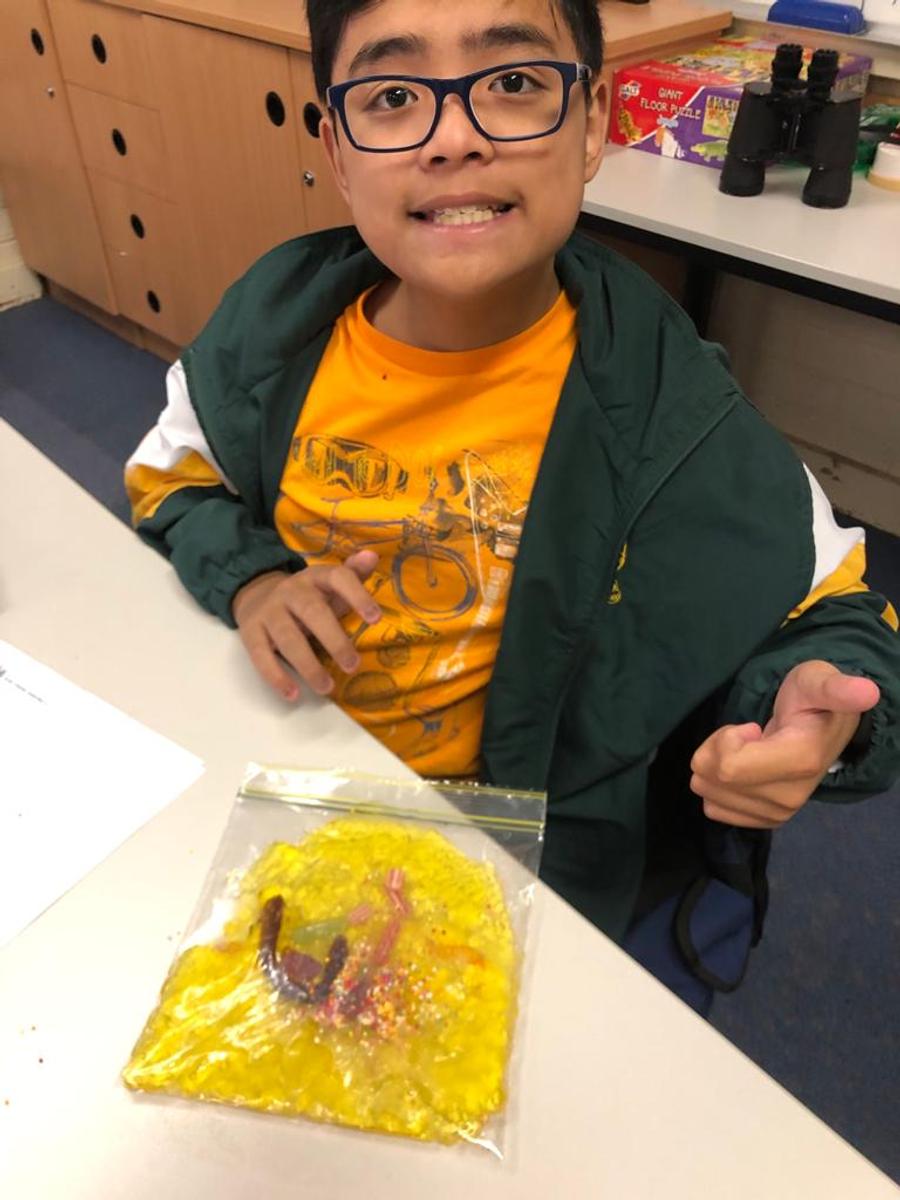Faculty News

LAF
It has been one busy term in LAF with so many exciting things that has happened! Our senior students have had nine successful weeks of work placement. They all enjoyed all the valuable experiences that they learnt from the Secret Garden, Woolworths and the Avenue.
All LAF students had a brilliant time at the Sydney Zoo excursion. The weather was beautiful that day and students got to see the wide variety of animals that were there. They up close and personal with roaming emus and saw African animals such as lions, giraffes and zebras! They got to enjoy lunch there as well after using their money skills to purchase lunch. Students were on their best behaviour and we cannot wait to go back to participate in the education programs.
This term in Science, students have been learning about the structure and functions of living organisms. Students learnt an acronym 'MRS GREN' for the seven life functions (Movement, Respiration, Sensitivity, Growth, Excretion and Nutrition). They have also learnt about plant and animal cell structure and had fun making 3D structures of plant and animal cells using jelly and different lollies. In week 9, they have started learning about classification of living organisms. To help them remember the eight groups of classifications (Domain, Kingdom, Phylum, Class, Order, Family, Genus and Species), they have learnt and memorised the sentence 'Don't Kids Prefer Candy Over Fresh Green Salad'. to remember the 8 groups. Students had fun learning the sentence and all of them remember the groups of classification.
LOTE
Japanese
Japanese is at full swing at Evans High School. Students from years 7-10 are enjoying learning the language. Japanese lessons have been an exciting introduction to the wonderful culture that birthed ninjas, crazy robotics, sushi and of course, many of our students' much beloved anime and manga (Japanese animation and cartoons). By learning Japanese, our students can also boast a new language skill- a huge benefit in our globalised and multicultural society. Our students have already learnt how to introduce themselves and others in Japanese, and are now learning the numbers. To our Japanese students, "Ganbatte!" (Keep up the good work).
German
In term 1, students in 7H, 7R, 8T, 8S, 9ONE and 9TWO began their German learning journey with Miss Von! In just 9 weeks, students have learnt:
- The German alphabet
- Basic greetings and phrases (hello, goodbye, yes, no, etc.)
- How to ask for and provide names
- How to ask someone how they are, as well as tell someone how you are
- Polite language (please, thank you, you’re welcome, etc.)
A few classes that are ahead have also learnt how to construct simple German sentences using pronouns, verbs and adjectives.
So, the next time you see Miss Von or any members of the classes listed above, don’t be afraid to say ‘Hallo’ or ‘Guten Tag’. These mean ‘hello’ or ‘good day’ in German.
Bis dann! (Until then!)
English
Year 7
Students have been studying the importance of failure and the role mistakes play in becoming successful. We have been looking at famous people that have succeeded through implementing a growth mindset. Students completed case studies that focused on the lives of Michael Jordan and J.K Rowling. Their assessment task for this Term was a TED Talk that students presented in class to their peers which were interesting and engaging.
Excerpt from Manxue’s Assessment:
“You might never fail on the scale I did, but some failures in life are inevitable. It is impossible to live without failing at something, unless you lived so cautiously that you might as well not lived at all, in which case you fail by default.” In other words, everyone fails unless you are so careful but that means your life is not complete. J.K Rowling uses the technique of repetition to bring attention to the words fail, failing and failure which shows the importance of moving on from it. Failure is a part of her life. She said, 'failure strips away inessential (unnecessary)'. From J.K Rowling we can learn not to give up and keep chasing your dreams no matter what.
It is important to adapt in changing situations then you are prepared for what might not be expected. Develop skills such as resilience and a positive mindset helps you keep your sense and continue on. So, after my Ted Talk, I want you to understand that failure is not the opposite of success, it is a part of success. Without it you will never succeed. Don’t be afraid to lose this game of life, keep trying and you will get there.
Year 8
In term one, Year 8 have studied prejudice, discrimination and injustice and the value of their representation in texts. In class, students have closely studied autobiographies, such as ‘The Diary of a Young Girl’ by Anne Frank, ‘Chinese Cinderella’ by Adeline Yen Mah and ‘Hana’s Suitcase’ by Karen Levine. In their assessments, students wrote persuasive speeches that they presented to their classes exploring the causes and effects of discrimination and injustice.
Year 9
This term, Year 9 have been completing a unit on the novel 'A Monster Calls' by Patrick Ness. They have been learning to identify and analyse the effect of imaginative techniques and to use these techniques themselves. Students are writing their own imaginative narrative for their assessment task to demonstrate the skills they have learnt throughout the unit. They are also writing a reflection on their narrative to build their understanding of their own personal writing style and the skills they are learning to use in their writing. From Week 9 onwards, students are completing a unit in persuasive writing to assist them in preparing for their NAPLAN tests in May.
Year 10
Year 10 have studied either Anh Do’s memoir 'The Happiest Refugee' or Ray Bradbury’s 1953 novel 'Fahrenheit 451', with a focus on identifying and analysing the main ideas in each text and the ways in which they are represented through language techniques. Students focused on developing their analytical writing skills and their ability to identify and explain the effects of language techniques on the ideas they are representing. For their assessment task this term, students presented a five minute speech to their class on the text they were studying.
Year 11 Standard English
This term, the students in the Year 11 Standard English course have undertaken a unit of work called 'Reading to Write: Transition to Senior English.' As the name of the unit suggests, the students have been reading and analysing a variety of quality literature to develop and enhance their own writing ability. Students have been encouraged to draw inspiration from the studied texts and authors and experiment with narrative structure and a plethora of language techniques.
A short extract below from one student's imaginative writing piece demonstrates the results of their learning thus far:
I watch Violet as she sleeps. She’s as pale as a ghost. Her breathing is ragged and her chest is moving up and down erratically. I know I will be risking my life but I would rather much save my sister than watch her slowly take her last breath. Much like sand in an hourglass, her time is running out and I’m the only one who can save her.
Year 11 Advanced English
Year 11 Advanced English has been studying the Common Module: Reading to Write this term. They have been focusing on closely analysing imaginative, discursive and persuasive texts from a variety of composers in order to identify and analyse the effects of writing techniques on each composer’s writing style and the ways in which they communicate their ideas. Students have been experimenting with their own writing style and with implementing a variety of different language techniques into their written responses in order to broaden their skills, have fun with their writing and develop their own sense of personal voice in their writing.
Year 12 Standard English
In Term 1, Year 12 Standard English has been studying Asian-Australian poets, such as Jaya Savige and Maureen Ten, exploring and analysing the representation of language, identity and culture in these texts. In their assessment task, students closely analysed one of the prescribed poems and used it as inspiration for their own imaginative text exploring culture and identity.
Year 12 Advanced English
Year 12 Advanced English have studied Module A: Textual Conversations this term through the close analysis of 'The Tempest' by William Shakespeare and 'Hag-seed' by Margaret Atwood. They have been developing their understanding of the ways in which texts ‘converse’ with each other and start conversations about the ideas they are representing. In addition, students have studied the next segment of Module C: Craft of Writing by revisiting the techniques and skills they require to complete imaginative, discursive, persuasive and analytical texts.














